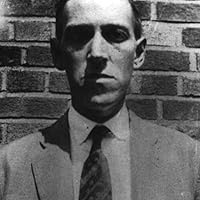Dissociated Quotes
Quotes tagged as "dissociated"
Showing 1-30 of 38

“The most merciful thing in the world, I think, is the inability of the human mind to correlate all its contents... some day the piecing together of dissociated knowledge will open up such terrifying vistas of reality, and of our frightful position therein, that we shall either go mad from the revelation or flee from the light into the peace and safety of a new Dark Age.”
―
―
“Dissociation gets you through a brutal experience, letting your basic survival skills operate unimpeded…Your ability to survive is enhanced as the ability to feel is diminished…All feeling are blocked; you ‘go away.’ You are disconnected from the act, the perpetrator & yourself…Viewing the scene from up above or some other out-of-body perspective is common among sexual abuse survivors.”
― Repressed Memories: A Journey to Recovery from Sexual Abuse
― Repressed Memories: A Journey to Recovery from Sexual Abuse
“Fear and anxiety affect decision making in the direction of more caution and risk aversion... Traumatized individuals pay more attention to cues of threat than other experiences, and they interpret ambiguous stimuli and situations as threatening (Eyesenck, 1992), leading to more fear-driven decisions. In people with a dissociative disorder, certain parts are compelled to focus on the perception of danger. Living in trauma-time, these dissociative parts immediately perceive the present as being "just like" the past and "emergency" emotions such as fear, rage, or terror are immediately evoked, which compel impulsive decisions to engage in defensive behaviors (freeze, flight, fight, or collapse). When parts of you are triggered, more rational and grounded parts may be overwhelmed and unable to make effective decisions.”
― Coping with Trauma-Related Dissociation: Skills Training for Patients and Therapists
― Coping with Trauma-Related Dissociation: Skills Training for Patients and Therapists

“I've felt as if I didn't exist, as if I were invisible, miles away from the world, miles away. You can't imagine how much alone I've been all my life.”
― The Sea, the Sea
― The Sea, the Sea
“Triggers are like little psychic explosions that crash through avoidance and bring the dissociated, avoided trauma suddenly, unexpectedly, back into consciousness.”
―
―

“I feel something change in me... I feel a flat calm, a detachment, the way I get when something is too much and yet l must function and in fact function at the highest level. I know what I'm in for, only a fool wouldn't know that...”
― Red Mist
― Red Mist
“Dissociation is numbness and nothingness; it is a feeling of being lost; it is floating on a cloud that threatens to suffocate; it is automatic speech and action without awareness or control; it is looking at the world and blinking to try to remove the blurry fog; it is hearing and seeing the immediate world and simultaneously feeling very far away; it is raw fear; it is unfamiliarity in familiar places; it is possession; it is being haunted everyday by unknown monsters that can be felt but not seen (at least not by others); it is looking in the mirror and not knowing who is looking back; it is fantasy and imagination; and, above all else, it is survival. Dissociation is all of these things and none of them at once.”
―
―
“Posttraumatic stress disorder (PTSD) also has dissociative symptoms as an essential feature. PTSD has been classically seen as a biphasic disorder, with persons alternately experiencing phases of intrusion and numbing... [T]he intrusive phase is associated with recurrent and distressing recollections in thoughts or dreams and reliving the events in flashbacks. The avoidant/numbing phase is associated with efforts to avoid thoughts or feelings associated with the trauma, emotional constriction, and social withdrawal. This biphasic pattern is the result of dissociation; traumatic events are distanced and dissociated from usual conscious awareness in the numbing phase, only to return in the intrusive phase.”
― Rebuilding Shattered Lives: Treating Complex PTSD and Dissociative Disorders
― Rebuilding Shattered Lives: Treating Complex PTSD and Dissociative Disorders
“While he can interact with others who have no idea that anything is wrong, Ron lives without spontaneity, going through the motions, doing what he thinks people expect him to do, glad that he is able to at least appear normal throughout the day and maintain a job. He studied drama briefly while in college, and remains enamored of Shakespeare and literature, but an emerging self-consciousness eventually robbed him of his ability to act. Now he feels as if all of his life is an act—just an attempt to maintain the status quo.
Recalling literature he once loved, he sometimes pictures himself as Camus’s Meursault, in The Stranger: an emotionless character who plods through life in a meaningless universe with apathy and indifference. He’s tired of living
this way but terrified of death.”
― Feeling Unreal: Depersonalization Disorder and the Loss of the Self
Recalling literature he once loved, he sometimes pictures himself as Camus’s Meursault, in The Stranger: an emotionless character who plods through life in a meaningless universe with apathy and indifference. He’s tired of living
this way but terrified of death.”
― Feeling Unreal: Depersonalization Disorder and the Loss of the Self
“It isn't depression, or anxiety, though it can sometimes appear as a symptom of these better—known conditions. Often, it emerges with cruel ferocity as a chronic disorder completely unto itself.
Its destructive impact on an individual’s sense of self is implied in its very name—depersonalization.”
― Feeling Unreal: Depersonalization Disorder and the Loss of the Self
Its destructive impact on an individual’s sense of self is implied in its very name—depersonalization.”
― Feeling Unreal: Depersonalization Disorder and the Loss of the Self

“I felt a catch in my chest and a pulsing in my ears and then I felt calm and numb, with a fuzziness that I couldn't think through, much thicker than before.”
― The Sum of My Parts: A Survivor's Story of Dissociative Identity Disorder
― The Sum of My Parts: A Survivor's Story of Dissociative Identity Disorder

“You’re in shock.
You can’t afford to be in shock.
Two parts of himself were having a conversation.
You were probably meant to think of yourself as ‘I’ when talking to yourself.”
― Moskva
You can’t afford to be in shock.
Two parts of himself were having a conversation.
You were probably meant to think of yourself as ‘I’ when talking to yourself.”
― Moskva

“I feel no emotional connection to these outwardly human gestures.
I am not there, because I never left Afghanistan.”
― Among You: The Extraordinary True Story of a Soldier Broken By War
I am not there, because I never left Afghanistan.”
― Among You: The Extraordinary True Story of a Soldier Broken By War

“I was not descending in a plane, coming Home.
I was watching an alien world as it ascended towards me - and one that I could never begin the process of readjusting to, because I knew that I would just as soon be returning to another world, whose normality was as alien to this home as I now was.”
― Among You: The Extraordinary True Story of a Soldier Broken By War
I was watching an alien world as it ascended towards me - and one that I could never begin the process of readjusting to, because I knew that I would just as soon be returning to another world, whose normality was as alien to this home as I now was.”
― Among You: The Extraordinary True Story of a Soldier Broken By War

“You are no longer human, with all those depths and highs and nuances of emotion that define you as a person.
There is no feeling any more, because to feel any emotion would also be to beckon the overwhelming blackness from you. My mind has now locked all this down. And without any control of this self-defence mechanism my subconscious has operated. I do not feel any more.”
― Among You: The Extraordinary True Story of a Soldier Broken By War
There is no feeling any more, because to feel any emotion would also be to beckon the overwhelming blackness from you. My mind has now locked all this down. And without any control of this self-defence mechanism my subconscious has operated. I do not feel any more.”
― Among You: The Extraordinary True Story of a Soldier Broken By War

“the reality of being here eludes me, I can’t focus, I am dazed. And I want to stay this way. If I have too much clarity, I will be undone, I fear.”
― Wave
― Wave

“How could I even function today if all of this happened to me?" I pleaded, wishing Dr. Summer would tell me that he'd been wrong, that all of those thoughts didn't belong to me.
Dr. Summer reminded me gently, "When you were attacked, your mind went far away so you could survive. Some people describe this as an out-of-body experience. Your mind creatively and instinctively protected you by dissociating from the violence and terror. When you talk about the thoughts in your head, you have a flat demeanor like you're talking about someone else. Doesn't it feel that way to you?"
"Yes. It doesn't ever feel like I'm talking about me. It doesn't feel like it happened to me.”
― The Sum of My Parts: A Survivor's Story of Dissociative Identity Disorder
Dr. Summer reminded me gently, "When you were attacked, your mind went far away so you could survive. Some people describe this as an out-of-body experience. Your mind creatively and instinctively protected you by dissociating from the violence and terror. When you talk about the thoughts in your head, you have a flat demeanor like you're talking about someone else. Doesn't it feel that way to you?"
"Yes. It doesn't ever feel like I'm talking about me. It doesn't feel like it happened to me.”
― The Sum of My Parts: A Survivor's Story of Dissociative Identity Disorder
“We can think of dissociation as psychological disconnection from one or more of three major spheres of experience: (a) the here and now, i.e., orientation to time and place; (b) other people, i.e., interpersonal communion; and (c) one’s own subjective experience, e.g., visceral sensation, physical pain, affect, or sense of identity. The various manifestations of pathological dissociation e.g., amnesia, depersonalization, identity fragmentation–can be understood as manifestations of these dimensions of disconnection.”
―
―

“I was dizzy in that room. I felt faint with disbelief. I held on to the seat of my chair to stay upright. I knew what was going on, but I couldn’t absorb any of it.”
― Wave
― Wave

“Sometimes I look older than I feel. Sometimes my hands seem bigger than they should be or I feel taller than I think I should be.”
― The Sum of My Parts: A Survivor's Story of Dissociative Identity Disorder
― The Sum of My Parts: A Survivor's Story of Dissociative Identity Disorder

“I find that I cannot be in the here and now.”
― Among You: The Extraordinary True Story of a Soldier Broken By War
― Among You: The Extraordinary True Story of a Soldier Broken By War

“The creation of these "happy" parts felt different from the splitting that began at my fingertips when I was under attack. Entering these "good" parts felt less noticeable. There was some dizziness and light-headedness, but it was mainly just a gentle shifting in my mind.
I was unsure of where my body started and ended for just a few seconds.”
― The Sum of My Parts: A Survivor's Story of Dissociative Identity Disorder
I was unsure of where my body started and ended for just a few seconds.”
― The Sum of My Parts: A Survivor's Story of Dissociative Identity Disorder

“I heard this as if the doctor were at other end of a long tunnel. I had trouble connecting his words into sentences with meaning.”
― The Sum of My Parts: A Survivor's Story of Dissociative Identity Disorder
― The Sum of My Parts: A Survivor's Story of Dissociative Identity Disorder

“From that mild dissociation, I quickly went into a deeper dissociative state if there was conflict around me, if someone expressed strong emotions, or if something unpredictable happened. Although these difficult situations triggered me, they brought out behavior that helped me do well when the going got tough. I loved solving problems and getting into the thick of things and also had well-developed skills in reading people and anticipating their needs.”
― The Sum of My Parts: A Survivor's Story of Dissociative Identity Disorder
― The Sum of My Parts: A Survivor's Story of Dissociative Identity Disorder

“I am as if paralysed: over there in the chamber the gas people and we are supposed to sing!”
― The Last Jew of Treblinka
― The Last Jew of Treblinka

“In the doorway stood a figure, light forming a halo around his head.
He isn’t really there,
Tom told himself.
You’re hallucinating.
If he could split into different parts that talked to each other, perhaps one of them had gone to the door.
‘Major Fox?’ it enquired.
So polite, this hallucination.”
― Moskva
He isn’t really there,
Tom told himself.
You’re hallucinating.
If he could split into different parts that talked to each other, perhaps one of them had gone to the door.
‘Major Fox?’ it enquired.
So polite, this hallucination.”
― Moskva

“dissociating put me at higher risk for attacks in my neighborhood and at school, making me more easily identified by sexual predators”
― The Sum of My Parts: A Survivor's Story of Dissociative Identity Disorder
― The Sum of My Parts: A Survivor's Story of Dissociative Identity Disorder
“There are some DID clients whose pathological dissociation was triggered by accidents or natural disasters. For example, I treated one client whose first alter was created after the young host accidentally fell off a raft and was pulled under by a strong wave. In sheer terror, she utilized her innate capacity to dissociate before she was rescued.”
― Treating Dissociative Identity Disorder: The Power of the Collective Heart
― Treating Dissociative Identity Disorder: The Power of the Collective Heart
All Quotes
|
My Quotes
|
Add A Quote
Browse By Tag
- Love Quotes 97.5k
- Life Quotes 76k
- Inspirational Quotes 73k
- Humor Quotes 43.5k
- Philosophy Quotes 29.5k
- Inspirational Quotes Quotes 27k
- God Quotes 26k
- Truth Quotes 23.5k
- Wisdom Quotes 23.5k
- Romance Quotes 23k
- Poetry Quotes 22k
- Death Quotes 20k
- Happiness Quotes 18.5k
- Life Lessons Quotes 18.5k
- Hope Quotes 18k
- Faith Quotes 18k
- Quotes Quotes 16.5k
- Inspiration Quotes 16.5k
- Spirituality Quotes 15k
- Religion Quotes 15k
- Motivational Quotes 15k
- Writing Quotes 15k
- Relationships Quotes 14.5k
- Life Quotes Quotes 14k
- Love Quotes Quotes 14k
- Success Quotes 13.5k
- Time Quotes 12.5k
- Motivation Quotes 12k
- Science Quotes 11.5k
- Motivational Quotes Quotes 11.5k

